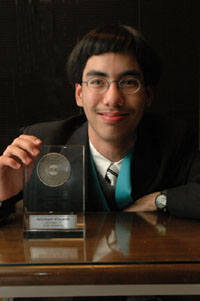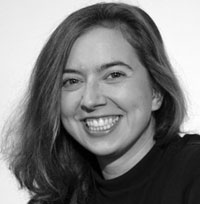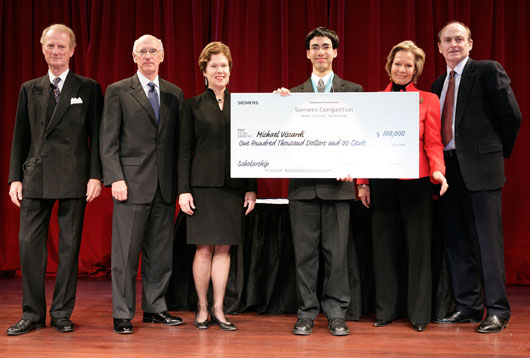Homeschooler Wins the Siemens Westinghouse Competition
By Sarah Pride
Printed in Practical Homeschooling #70, 2006.
 It's arguably the most important math / science / technology competition in the world. How did homeschooler Michael Viscardi win it?
It's arguably the most important math / science / technology competition in the world. How did homeschooler Michael Viscardi win it?

|
 |

Photos © The Siemens Foundation
Sixteen-year-old Michael Viscardi walks onto the stage at New York University and poses for the media with a giant check. The amount? $100,000. The homeschooled senior has just won the Siemens Westinghouse Competition in Math, Science, and Technology, a nationwide contest that involved 1,684 entrants this past year.
It is not unusual for homeschooled students to win prominent national competitions. The first to hit national headlines was Rebecca Sealfon, a 13-year-old who won the National Spelling Bee in May of 1997. (We interviewed her in PHS #19.) Since then, homeschoolers have consistently racked up these awards. In 1999, David Beihl became the first homeschooled student to win the National Geography Bee. In 2000, homeschoolers swept the top three spots at the National Spelling Bee.
Viscardi's win at the Siemens Westinghouse Competition, however, is thus far the most profitable achievement of all. To accomplish it, he submitted his original research paper, "On the Solution of the Dirichlet Problem with Rational Boundary Data," to the Siemens Foundation, which operates the contest in partnership with the College Board. Experts in the different fields "blind read" the papers on their merits alone, without any identifying data for the authors whatsoever. They chose the top 300 in both the individual and team categories, and recognized them as semifinalists. The top 30 in each category were invited to attend six regional competitions, at which they created poster displays, presented their work, and attended private question-and-answer sessions with judges. The best individual and team in each region was then invited to the national competition. Here, although Viscardi took away the top individual prize of $100,000, every individual and team bagged at least $10,000. Further, everyone who made it to a regional competition won at least $1,000 for him or herself and $2,000 for his or her school. This is a financially rewarding contest!
 These bare-bones facts aside, we here at PHS found ourselves curious about the details. Just how smart is this Viscardi kid, and how did he get that way? Did he train specifically for this contest, and, if so, how? What is a Dirichlet problem anyway, and why is a big foundation willing to pay $100,000 for its solution? With a little research, we found our answers, which now we pass on to you.
These bare-bones facts aside, we here at PHS found ourselves curious about the details. Just how smart is this Viscardi kid, and how did he get that way? Did he train specifically for this contest, and, if so, how? What is a Dirichlet problem anyway, and why is a big foundation willing to pay $100,000 for its solution? With a little research, we found our answers, which now we pass on to you.
First, PHS publisher Mary Pride tracked Michael Viscardi down and secured a telephone interview. He is apparently very smart indeed, and is quite excited about math. As is becoming increasingly more common for gifted children in the failing public schools, he wanted to study further ahead than the available classes, so his parents decided to homeschool him. In the fifth or sixth grades, he already wanted to take college classes, but his parents said he was too young. Shortly thereafter, they spent two years in Tokyo, where Michael learned a lot of Japanese. Then they moved to San Diego, where he began taking dual credit calculus in eighth grade at the University of California at San Diego. Did Michael have any trouble enrolling? "I had to take a placement test, and I got a perfect score, so they decided I was qualified," he relates. This year, he was part of the winning national MathCounts team, and he was able to go to the Oval Office to meet President Bush.
Also in eighth grade, Michael met Dr. Peter Ebenfelt, his calculus professor, who became his mentor. "It's very important to have a mentor," says Michael. "We'd get together about once a week and talk about the research; he'd give me an idea about this and feedback about my proof about that. At the end I wrote the paper all on my own."
Michael did not train specifically for the Siemens Westinghouse competition. This was also the first year he entered science fairs. (He also won first place in the regional competition of the Junior Science and Humanities Symposium - see www.jshs.org) Says Michael, "I was doing the research for its own sake. When I went to the website, the application form was right there, so I just filled it in."
And last, what is a Dirichlet problem, and why does anyone care? I suggest you look it up on the Wikipedia (wikipedia.org). I did, and it didn't mean anything to me, despite my high-school AP Calculus course. It has something to do with complex analysis, and Michael's solution involves rational functions. According to one of the judges, Dr. Steven Krantz, Professor of Mathematics at Washington University in St. Louis, "[Michael's] research is profound, substantial and complete, with potentially important practical applications in heat flow, magnetism, electrodynamics and other branches of physics. One important and exciting potential application of his work is in designing the shape of airplane wings." Use this as a gauge of your viability for Siemens Westinghouse. If you have any idea what this all means, or think you might in the future, you may be a good candidate.
Meanwhile, Michael's future looks bright. He earned a perfect score on the SAT I and on several SAT II subject tests. Currently, he is concertmaster of the San Diego Youth Symphony and San Diego Youth Symphony Philharmonia, as well as first violinist of the San Diego Youth Symphony String Quartet. This coming fall, he will be using his $100,000 to attend Harvard University as a freshman math major. He also intends to continue studying his music.
With all he has already accomplished, what will this homeschooled student do in the future? We will be interested to see.